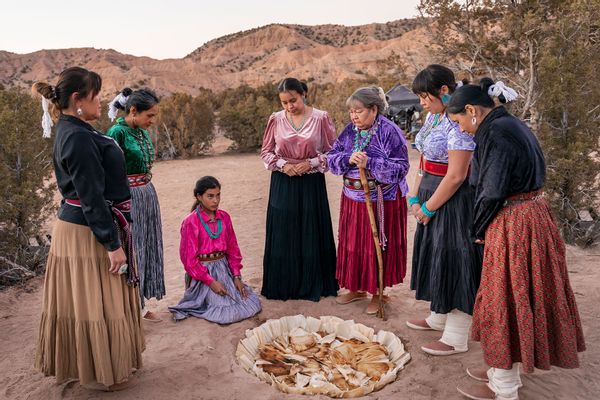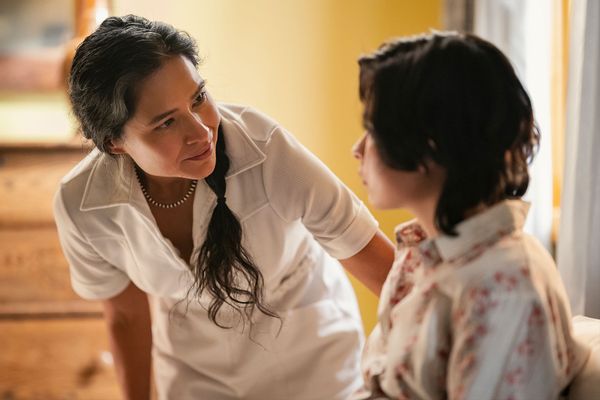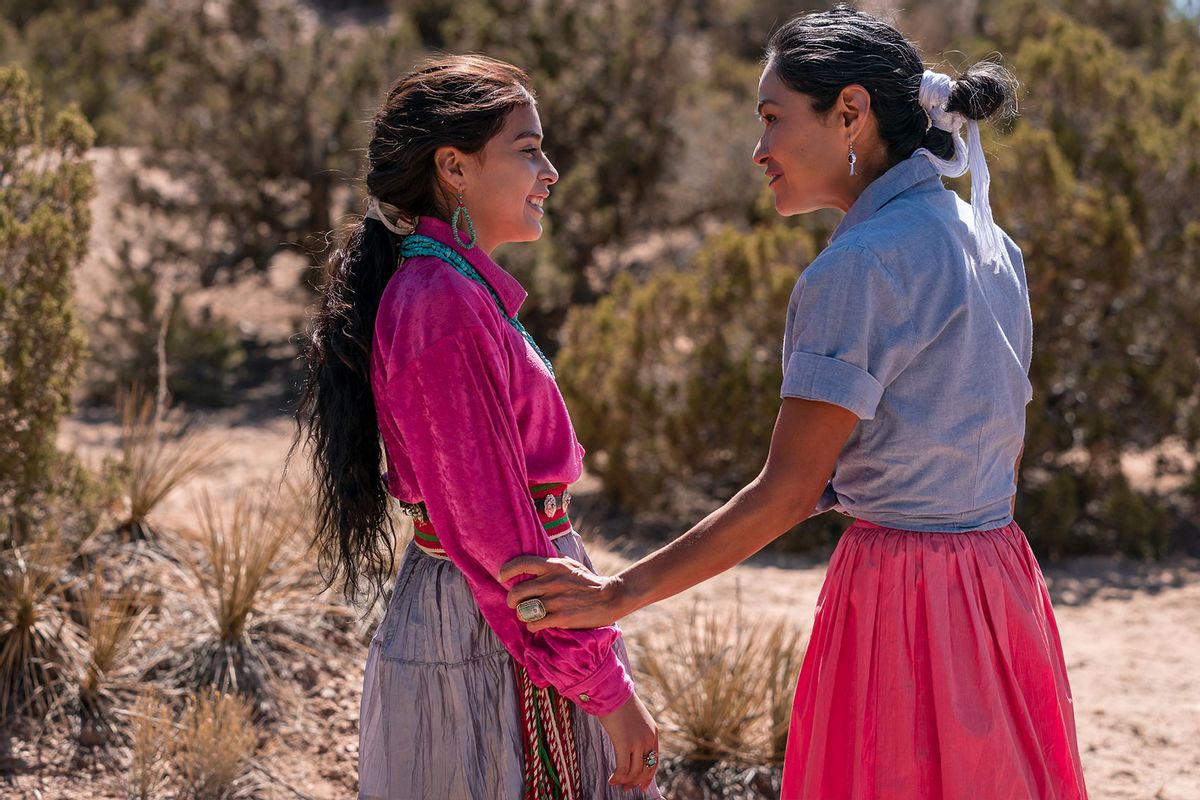Murder and corruption drive AMC's "Dark Winds," which was recently picked up for a second season, but the bright coming-of-age celebration in Episode 3, "K'e," provides a needed respite from all that.
Women gather around Joe and Emma Leaphorn's niece to mark the occasion of her first period, preparing food for and with her, cheering her on as she races across the landscape, smiling widely. These scenes add welcome layering to our view of the Leaphorns' world, and importantly, never take the audience out of the overall story.
All of this is by design, explains Maya Rose Dittloff, who co-wrote "K'e" with Razelle Benally. A benefit of working in an entirely Native writers' room is the shared understanding of the necessity of expanding the women characters in their adaptation of Tony Hillerman's Leaphorn and Chee mysteries.
"Dark Winds" stars Zahn McClarnon as Joe and Kiowa Gordon as Jim Chee, but the plot widens the space for Leaphorn's wife Emma (Deanna Allison) and Joe's fierce sergeant Bernadette Manuelito (Jessica Matten) as a matter of staying true to the 1970s era and the experience of life in their Navajo community.
That encompasses grimmer realities – the anguished death of another teen girl (Shawnee Pourier) drives Joe's investigation, forcing him to see the degrading regard with which white officers treat her remains. At the same time, Emma's tender sheltering of another young woman, an abuse survivor named Sally Growing Thunder (Elva Guerra), highlights the ways these circles of mothers, grandmothers, aunts, and daughters care for each other.
In our interview Dittloff – who is Mandan, Hidatsa, and Blackfeet – talked about the ways she and other writers incorporate lesser-known details of Native women's experience with reproductive injustice while highlighting the characters' joy and resilience, "hand[ing] some level of female empowerment back to those characters," she says.
This interview has been edited for length and clarity.
RELATED: From "Fargo" to "Dark Winds," Zahn McClarnon keeps perfecting his art – but don't call him an artist
One of the most enjoyable parts about this telling of "Dark Winds" is viewing the role women play in a story adapted from novels that primarily centered on two men. It seems the roles of Emma, Bernadette, and others are greatly expanded from the Leaphorn and Chee novels.
Definitely. So Season 1 of "Dark Winds" is mostly focused with on the Tony Hillerman novel "The Listening Woman," which was originally published in 1978. And a lot has changed since then, particularly with regard to the role of women, so you're completely right. The female roles needed to be updated. And as a part of the writers' room, alongside myself and Erica Tremblay and Razelle Benally, the three women in the room, we very much wanted to spend a lot of time, a lot of care, and a lot of attention on building out of female roles in the series.
"For so long, Native women have been denied autonomy on screen."
So of course, we've got Emma Leaphorn, we've got the addition of Sally Growing Thunder, Ada Growing Thunder (Amelia Rico), Bernadette Manuelito. And of course, you know, with the exception of maybe Emma, none of them are in the book. So we were picking and choosing across Tony Hillerman novels because Native women are such an important and integral part of our communities.
Specifically, in the episode that I co-wrote with Razelle, Episode 3, we wanted to celebrate the Kinaaldá, which is the Navajo coming of age ceremony when young girls get their period. So, also showing what it means to grow into womanhood – something that has never been seen on screen before, and something that we wanted to address with a lot of sensitivity and care. Because for so long, Native women have been denied autonomy on screen, and those stories had been co-opted. So we wanted to spend a lot of time with that love and care towards those characters.
 Makena Ann Hullinger as Nanobah, Deanna Allison as Emma Leaphorn and Geraldine Keams as Grandma Alice in "Dark Winds" (Michael Moriatis/Stalwart Productions/AMC)
Makena Ann Hullinger as Nanobah, Deanna Allison as Emma Leaphorn and Geraldine Keams as Grandma Alice in "Dark Winds" (Michael Moriatis/Stalwart Productions/AMC)
I wonder how many people realize how much of the history of, for instance, how this country has treated and exploited Indigenous women, is woven through "Dark Winds." The way it is threaded through the story is very natural
For instance, there are aspects of the story that cover the reproductive history and reproductive politics within the Navajo community. One of those moments is the scene in the first episode, where Emma is speaking with Sally in the doctor's office and telling her, in Navajo, what the doctor really intends to do to her while she's giving birth if she has her child at the clinic. She's talking about forced sterilization, which Emma has personal experience of, but in warning Sally, it's also a protective and political act.
Yes, definitely. There is a very storied but a highly unknown history of forced sterilization in the United States and Canada.
Specifically, as to "Dark Winds" in the 1970s, about 25% of Native women would have been forcibly sterilized, which is an absolutely insane figure. And sometimes that looked like going in for like a tonsillectomy or like a normal procedure., joining the long legacy of Native peoples being tricked. And what happened while they were under anesthesia – Native women were often suggested to sign the document, not knowing not understanding that they were electing to have these sterilizations – and what would come out kind of having no idea what happened. Sometimes women would never find out that they had been forcibly sterilized; they just thought they couldn't ever have children, when in fact, at a normal trip to the doctor, this had happened.
It's such an immense tragedy, because when you think of that 25%, you know, think of all of the children that could have been born and the lives that could have been lived. Those are mothers in their own right, medicine men, leaders, people who were taken from us, because the federal government decided that Natives were having too many babies.
So yes, a lot of the autonomy of Native women has been taken away. And this is part of it.
In the past I've interviewed Sterlin Harjo about "Reservation Dogs," and Sierra Ornelas about "Rutherford Falls," and one commonality in those conversations is a real desire to bring real joy into their shows' storytelling. I understand that, since there's this common pop-cultural misperception that stories of Indigenous peoples in the Americas have to in some way incorporate suffering. Was that in mind for you, as you were expanding these roles?
"What we wanted to smuggle in was a greater story about what it means to be Native, but also to go beyond just representation."
Oh, definitely. For so long in the history of Hollywood and of filmmaking, Native women have been invisible or existed on the periphery. And we get the same extremely tired tropes of the Indian maid and Native women as a symbol for a Wild West that has been lost. And oftentimes that does include being raped, as kind of one of those pillars of like the Western genre, which is absolutely abhorrent. So we wanted to reclaim the space that Native women exist, and like all other women, we deserve bodily autonomy.
In the same hand, although "Dark Winds" is not a comedy, we wanted to bring visibility to the stories of our Native women that we hope can be a comfort and that can start a conversation towards a greater sense of justice. So that was definitely our hope, and specifically with Emma and caretaking for Sally Growing Thunder and saying, "Hey, this is a possibility, this might happen to you." That kind of care that you see between Native moms and aunties and elders in the community. Just to have this older Native woman caretaking for the next generation was important to us.
 Deanna Allison as Emma Leaphorn and Elva Guerra as Sally Growing Thunder in "Dark Winds" (Michael Moriatis/Stalwart Productions/AMC)
Deanna Allison as Emma Leaphorn and Elva Guerra as Sally Growing Thunder in "Dark Winds" (Michael Moriatis/Stalwart Productions/AMC)
It strikes me that this is one of the few stories on TV that isn't just about Native culture, but specifically about a matriarchal culture. And I wondered how much of that tradition played into expanding the characters. For instance, Bernadette is a woman with a very independent personality. And there are signs of it within the relationship of Emma and Sally, particularly in the decision of having her stay with them, but also, within the Kinaaldá, their kinship and deference to the medicine woman and the different elders within the community.
Of course. Walking into a show that's first and foremost about Leaphorn and Chee, we knew that that's what audiences would be expecting, that they would want to be unraveling that mystery. What we wanted to smuggle in was a greater story about what it means to be Native, but also to go beyond just representation, like just having Natives on screen. We were looking into the future: what is the next iteration of telling Native stories?
And specifically, you're right. In the role of our women, of course, Emma Leaphorn is the ruler of her house, and she's putting together this Kinaaldá for [Nanobah]. She tells Joe, "We're going to house Sally, we have to caretake for her, even though they have no blood relation. And Leaphorn just kind of has to go through with that, because that is ingrained into the culture. Homeownership is a women's right. Women owned the hogans traditionally.
So, you know, these are the little ways that this culture informs the way that we approach storytelling. When women are in the house, how does that change how a man can operate in that space? And that's fascinating, because, you know, Leaphorn is a strong character. We wanted to make Emma Leaphorn just as strong.
"As Native people, our continuing existence is a radical act. At the end of the day, this is about eugenics, and what is the goal of eugenics but to decimate a population?"
So let's pull back and take a broader view of this moment. "Dark Winds" wrapped production on the season some time ago, obviously. What's it been like to see it running in a time when reproductive rights have just experienced a huge rollback?
It's been incredibly fascinating. Of course, Black and brown, Indigenous communities have faced an immensely different struggle as it relates to reproductive rights and justice. I'm so grateful to have the storyline about reproductive justice coming out and being introduced into the conversation because most folks don't know the story or have the whole history. So to be able to say this is an issue that Native women have been facing since the '70s is something that is so incredibly important for audiences to hear.
And I think in conversations of intersectionality, you know, is an element that people too often forget that is a part of an ongoing struggle. Only yesterday [June 29], the Supreme Court decided the case of Oklahoma v. Castro-Huerta, which effectively cuts into last year's ruling of McGirt v. Oklahoma, which is an affirmation of tribal sovereignty.
So in these ways, in Native communities, all of these things are interconnected. An attack on tribal sovereignty is an attack on Native women's bodily autonomy. So it's definitely been just a wild time. But I'm hoping that we're able to spark some greater conversation as well.
Want a daily wrap-up of all the news and commentary Salon has to offer? Subscribe to our morning newsletter, Crash Course.
In terms of heading into the second season, what storytelling goals do you have? Part of what I'm wondering is whether there's a discussion of how social politics in America will inform these stories, as they did this time – not overtly, but just as part of the storytelling.
As Native people, our continuing existence is a radical act. At the end of the day, this is about eugenics, and what is the goal of eugenics but to decimate a population? So, I think that an affirmation that we're still here, we're still thriving, we're in charge of our own narratives is something that is so incredibly important. And going into Season 2, we've got a deep commitment from the writers, the producing team, the directors to always be doing better. And that involves a great deal of listening and going to the community and asking, "Hey, what did you think? What can we do better?" That's a goal that we all keep near and dear, because as an Indigenous person, we think of our community ties differently than white America. We've got obligations to our community to do better. We're part of a larger whole. It's something that will always be at the center of my approach as a writer, and I know that a shared by the other writers in the room as well.
"Dark Winds" airs Sundays at 9 p.m. on AMC and streams on AMC+.
More stories like this:



Shares